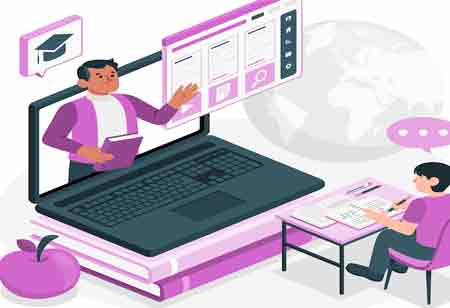THANK YOU FOR SUBSCRIBING
Be first to read the latest tech news, Industry Leader's Insights, and CIO interviews of medium and large enterprises exclusively from Education Technology Insights
Trends that will Shape the Future of Education
In addition to the pandemic and social alienation, traditional teaching models have also been put to the test by the imperative need to make place for innovative pedagogical approaches that are better matched to present demands.

By
Education Technology Insights | Tuesday, February 21, 2023
Stay ahead of the industry with exclusive feature stories on the top companies, expert insights and the latest news delivered straight to your inbox. Subscribe today.
Technology has proven to be a boon for the educational sector since Covid-19 happened. Educators comprehended the role of digitalization some time ago but the pandemic gave it a sudden boost and thrust.
FREMONT, CA: In addition to the pandemic and social alienation, traditional teaching models have also been put to the test by the imperative need to make place for innovative pedagogical approaches that are better matched to present demands. COVID-19 has only expedited the process of reconstructing education, abandoning traditional teaching methodologies. For instance, using Augmented Reality learning settings is already regarded as a mainstream practice, as is watching classes on mobile devices. In-depth learning has benefited greatly from the new immersive technology.
Here are the five trends that will dictate the future of education and several institutions have already applied them.
Personalised Education
Even though this education trend is not new, it has gained traction. Focused on the development of skills, it is necessary to invest in personalised education. Moreover, universities and schools should give extensive attention to each student.
Lifelong Learning
Lifelong learning promotes the idea that education should be lifelong rather than just for a few years. Hypothetically, schooling and winding up studies after graduation is insufficient. While formal education is important, development is a process that must be ongoing. Seeking specialisations and accompanying changes through continuing education courses will become increasingly important for a professional to differentiate themselves in the job market.
Immersive Technologies
The usage of innovative resources in universities increased after Facebook announced a substantial investment in the metaverse, a technical model that recently rose to prominence and is recognised as an interactive and hyper-realistic virtual world.
Distance Learning
In the education sector, the after-effects of the pandemic have accelerated innovations. Apparently, institutions, professors and students quickly had to acclimate to distance learning and teaching. More accessibility and flexibility are offered by online education, particularly for people who must balance employment and school. The obstacles are larger for teachers.
Teaching professionals must adapt to this new market, understand how to use current technologies, and, most importantly, acknowledge that they are no longer the only educators involved in the learning process.
Social interaction and meditation must be a part of every learning process. When a teacher adopts this stance, he/she is not just considered a knowledge transmitter, but a mediator.
Growth of Edtechs
With the advent of the metaverse and edtechs, companies that develop technological solutions for providing educational services such as teaching platforms, online courses, and other technological tools have emerged. Edtechs grew by 26 per cent during the Covid-19 pandemic and by 2025, edtechs will be worth more than 350 billion USD.







